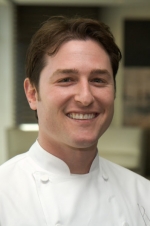Interview with Chef Scott Gottlich of Bijoux - Dallas
Antoinette Bruno: When and why did you start cooking? What inspired you to pursue cooking professionally?
Scott Gottlich: I’ve always worked in the industry. I started bagging groceries when I was in school. I come from a big family and eating together was always a big deal.
AB: Where have you worked professionally as a chef?
SG: I’ve worked all over the place. I was at Le Bernardin in New York for a while and at Aubergine with Tim Goodell in California before Bijoux.
AB: Would you recommend culinary school to aspiring cooks? Do you hire chefs with and without a culinary school background?
SG: I went to Johnson and Wales and graduated in 2000. I made the effort to go to school so I think it’s pretty important.
AB: Who are some of your mentors? What have you learned from them?
SG: Tim Goodell of Aubergine taught me a lot of technique. Eric Ripert taught me the art of execution and organization of very high cuisine. Chris Muehler, the ex-sous chef at Le Bernardin, is also one of my mentors.
AB: What question gives you the most insight to a cook when you’re interviewing them for a position in your kitchen?
SG: I want to know the last cookbook they read and what books they are reading in general. I need to know that they are interested in learning.
AB: What advice would you offer young chefs just getting started?
SG: You need to figure out what sector of the food industry you want to be in. You might fit in a little independent place, or a muti-unit hotel. It just depends on your personality and work style. You also need to be a leader and a good teacher but also be able to step back and let your team be part of the process.
AB: Which chefs do you consider to be your peers?
SG: Stephan Pyles, and the people at Aurora, Mansion on Turtle Creek, and Iris in Dallas.
AB: Is there any ingredient that you feel is particularly under appreciated or under utilized?
SG: I love thyme, garlic, and shallots. My favorite ingredients are simple and straight forward. I like to try to discover things that people don’t use quite as often and work with them like Skate or Hake.
AB: What are a few of your favorite flavor combinations?
SG: I like flavors all mixed up: bitter, sweet, sour, and salty. Blood orange and endive, for example, is really dynamic.
AB: What’s your most indispensable kitchen tool?
SG: The Vita-Prep blender is good. I like that you can make your purées, oils, almost anything in it. It’s very versatile. It’s much easier than the blenders we grew up on. It spins so fast it doesn’t damage the product. I like the Pacojet for sorbets.
AB: Describe a culinary technique that you have either created of borrowed and use in an unusual way.
SG: We use a double searing technique for our braised pork belly. Starting with uncured bacon, we sear it slowly, braise it in stock, chill it, cut it down to the desired size, and hold it for service. Then we sear it for service and bring it back up to temperature.
AB: What are your favorite cookbooks?
SG: Larousse Gastronomique has almost everything you need as a base and you can manipulate the information as you see fit.
AB: Where would you like to go for culinary travel? Why?
SG: Anywhere in France because I haven’t eaten in France. Spain would be great too.
AB: What are your favorite restaurants-off the beaten path-in your city?
SG: I loved Iris and the food that Matt Bresnan put out there, but unfortunately it just closed on Saturday. Cantina Laredo is great for Mexican food, and El Camarone on Maple and King has great papusas.
AB: What trends do you see emerging in the restaurant industry now?
SG: There are a lot more tasting menus and pre fixe options out there, you’re even seeing it at TGI Friday's!
AB: What is your philosophy on food and dining?
SG: Simplicity. Multiple levels of flavor and texture accentuate your technique but don't overdo it with flavors on the plate: take three things and really showcase them.
AB: If you weren’t a chef what do you think you’d be doing?
SG: I was going to go to law school so maybe a lawyer.
AB: What does success mean for you? What will it look like for you?
SG: In five years I’d like to have more restaurants; maybe a more casual bistro. Mostly I just want to build and expand upon the Bijoux family.
AB: How are you involved in your local culinary community?
SG: I try to donate to charitable causes. I also try to stay away from Chilean Sea Bass and other over-fished products because chefs should be concerned about maintaining a balance of what they put in and take out of the world.






